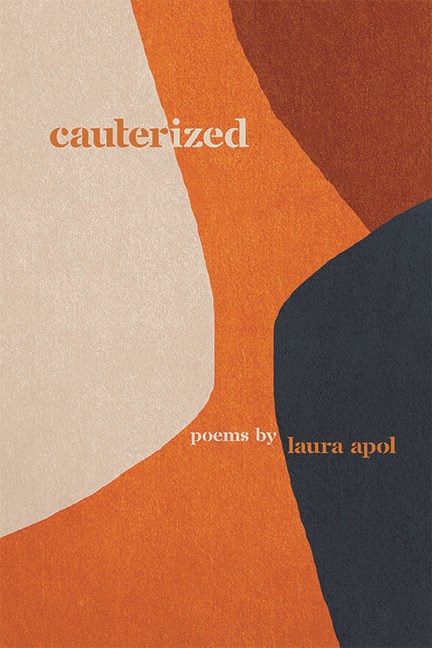In Cauterized, her sixth full poetry collection, Laura Apol skillfully excavates themes of grief, religious upbringing, aging, and evolving relationships by interrogating the ways in which wounds sow themselves into everyday life. Across seven sections, she explores the process of cauterizing these wounds and sees them reflected in the natural world around her – from the heron perched statuesque in the tide to the monarch shedding its chrysalis, each reflection a reminder of pain as well as a salve.
Ghosts sweep through every line of these poems, filling the words with their absence, in which Apol tries to find meaning. It would be easy to reduce this grief to the two-dimensional echo of hurt, but she resists this, instead exploring the ways they still inhabit her life with a unflinching outlook. Her daughter is a “long scorch of meteor – burning, / then gone” and Apol allows readers to feel the full force of loss in her poetry, conjuring recollections of the last words in a voicemail, “curled like/a fist, like an infant’s ear,” and the lingering scents of her daughter’s shampoo and clothes. Apol’s specters aren’t simply the dead, but are also impressions, moments of reverie or longing. In one poem, she recalls the bridges her father used to make – “the kind that take a soul / across a stream, a culvert, a dry creek bed.” In other poems, the narrator ruminates on a religious upbringing, repeats a still-remembered catechism or remembers the feeling of being “forced to fold hands/and pray.” Throughout these poems, the hollow of loss and memory takes shape as an unavoidable landscape, near intrusive in its insistence on filling the spaces it’s let into.
Apol treats the spirits of Cauterized kindly in giving them these spaces to inhabit. In “Memoir,” she imagines them in a cabin with a woodstove, waiting eagerly to be reunited. They take a variety of forms throughout: a hurricane bearing her daughter’s name, the rings the narrator wears on her fingers, each reminder that she returns to as raw as it is tender. In her poem “In Time,” her mother returns to her in the form of an eagle; her daughter shifts between a “sea turtle, hummingbird,/monarch.” Apol sees their impression the most in the natural world and the poetry is lush with the ecosystem surrounding it in the turn of the seasons. Winter appears and reappears in the lines, its coming a reminder of the unceasing river of time but also a lesson in crossing that flow. Her narrator describes a moment in which she watches a doe cross a river in the dying light of December knowing “what to take over, crossing; / what to leave behind.” Even after making the break into springtime, she still finds it to be a “season of loss – memory / in the ache of green.” Her own work is this act of bridging between the open wound and the scar and each poem of reaching acknowledges that there is only one way to cross: forward. “More beautiful mended / than before the breaking, I will never be,” she writes.
I found this collection to be more than the contents of its poems, but rather an invitation for us, the audience, to observe our own lives and the world around us. As Apol reminds us in one poem, “the river is pushing – always pushing – / downstream.” The sheer inevitability of time slipping is a concept that she cultivates beauty in. She lingers in these moments, some mundane, others bittersweet – in the sound of her son practicing Liszt’s etudes, in a blue bowl “the color/of sleep,” in the ritual of feeding the orioles sugar water and orange slices before they migrate every year come June. Her imagery and writing are rich and poignant, each underscoring the relationships she discusses with a delicate hand, shaped by memory and an inquisitive eye. In her grasp, sorrow becomes transformative, the monarch larvae in the cocoon, and pain is not an ending but a bridge towards healing.

POETRY
Cauterized
By Laura Apol
Michigan State University Press
Published January 1, 2024

